Unit 5 Wild animals may语法提升练(含解析)牛津译林版八年级英语上册
文档属性
| 名称 | Unit 5 Wild animals may语法提升练(含解析)牛津译林版八年级英语上册 | 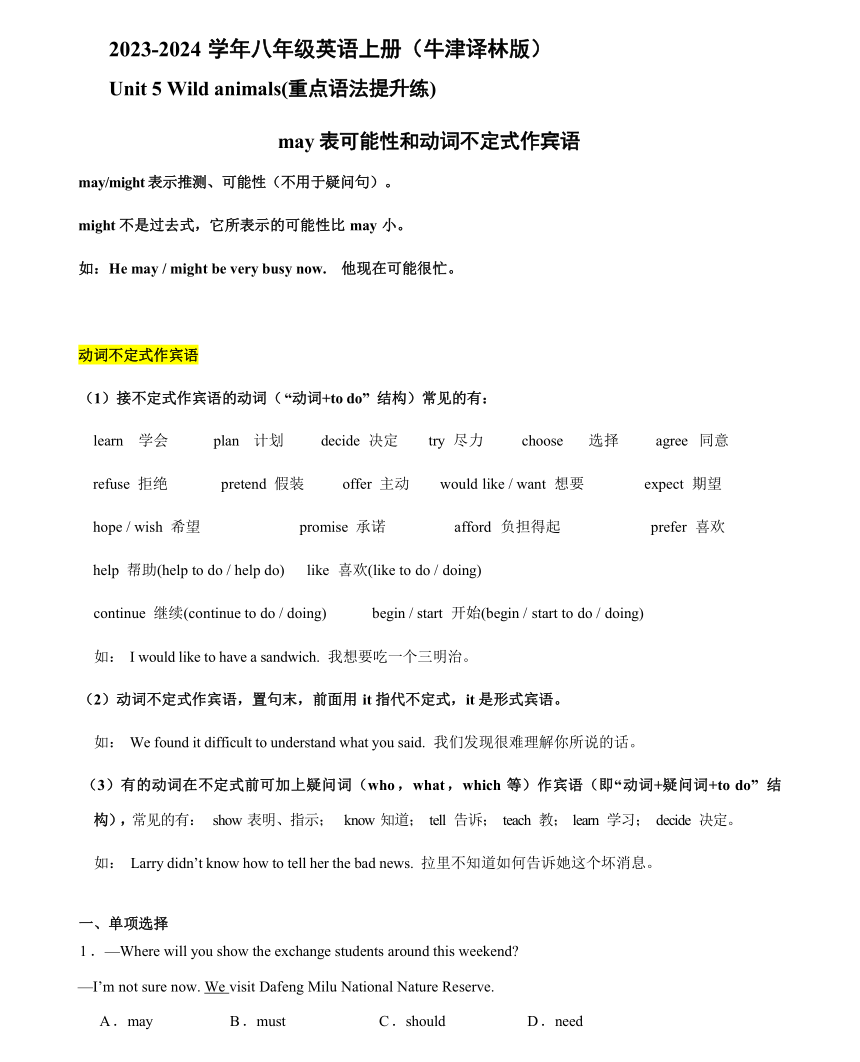 | |
| 格式 | docx | ||
| 文件大小 | 42.9KB | ||
| 资源类型 | 教案 | ||
| 版本资源 | 牛津译林版 | ||
| 科目 | 英语 | ||
| 更新时间 | 2024-01-02 10:37:12 | ||
图片预览

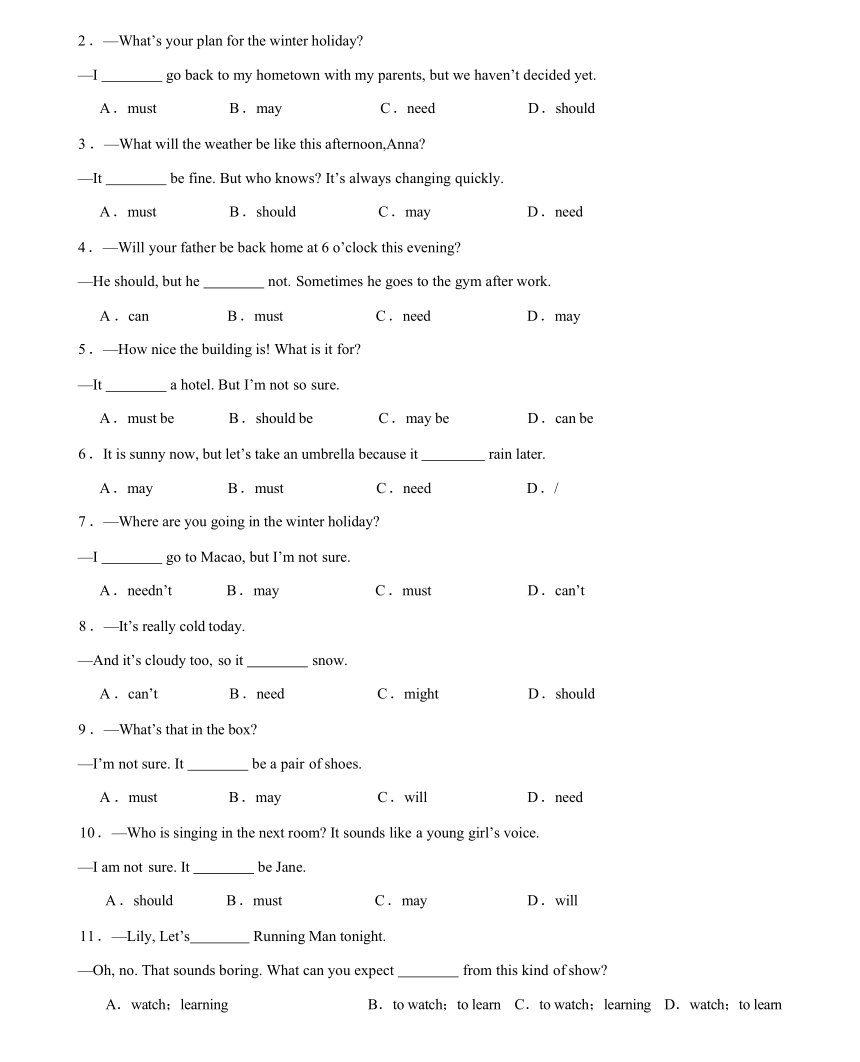
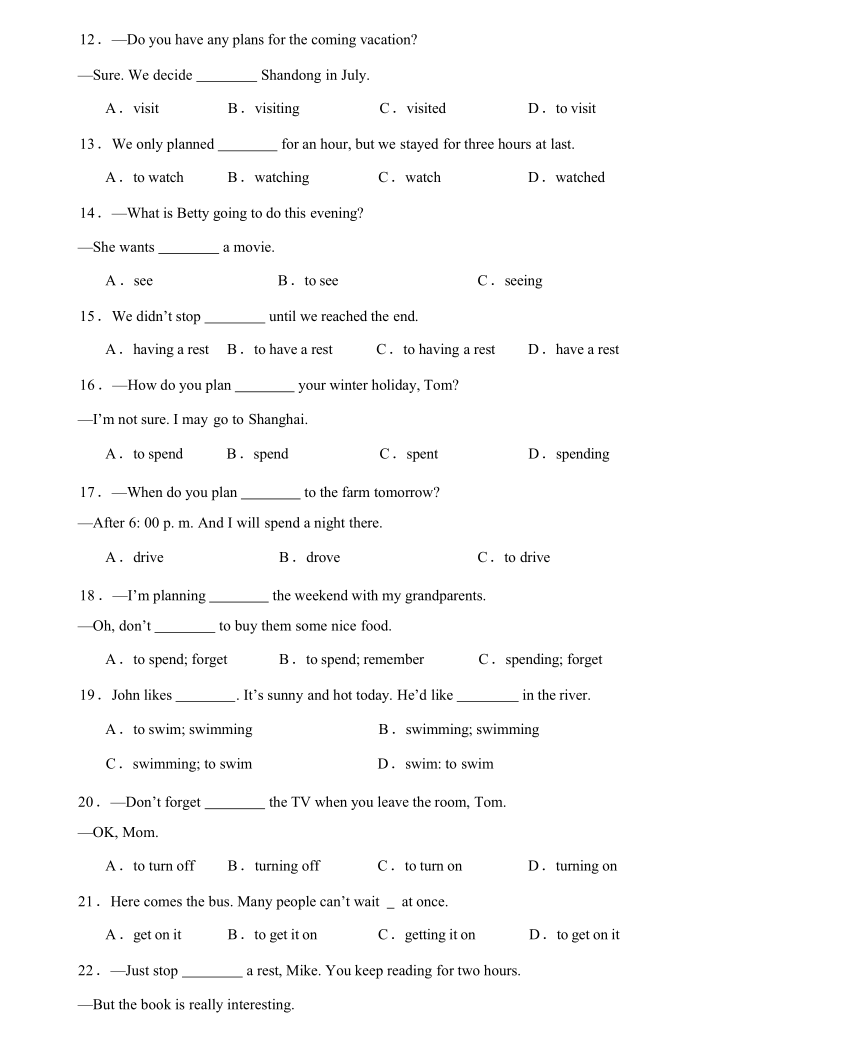
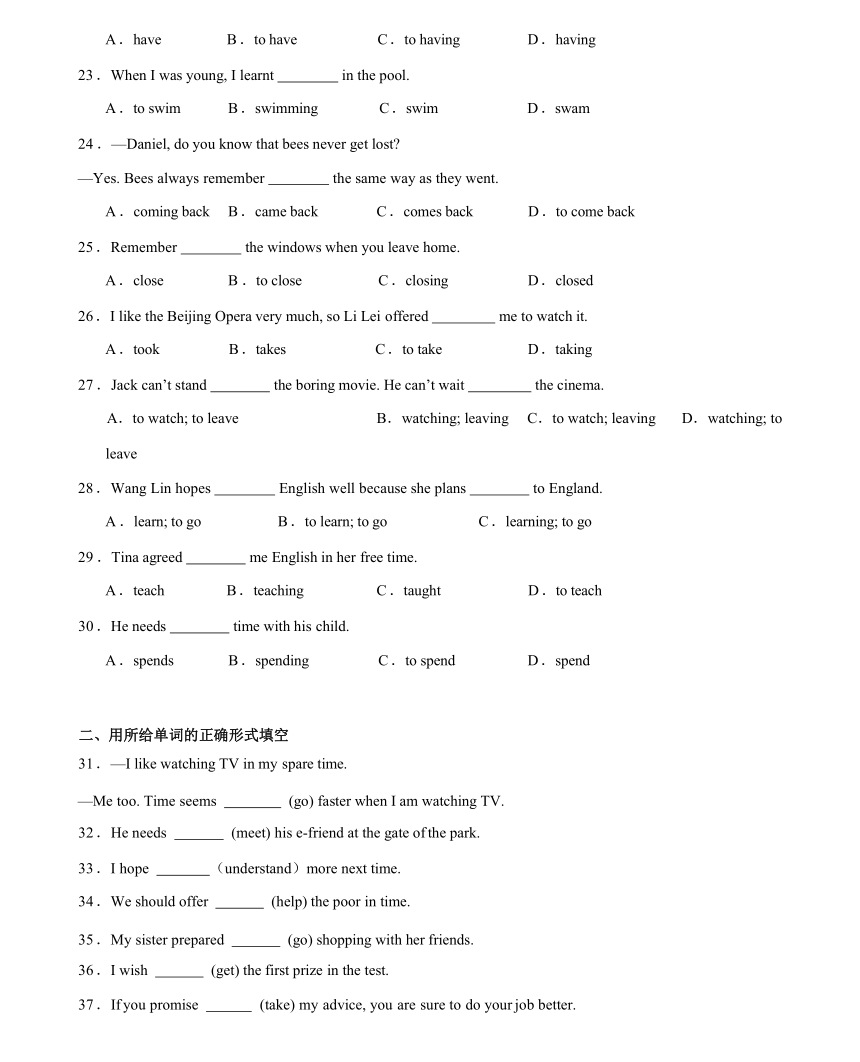
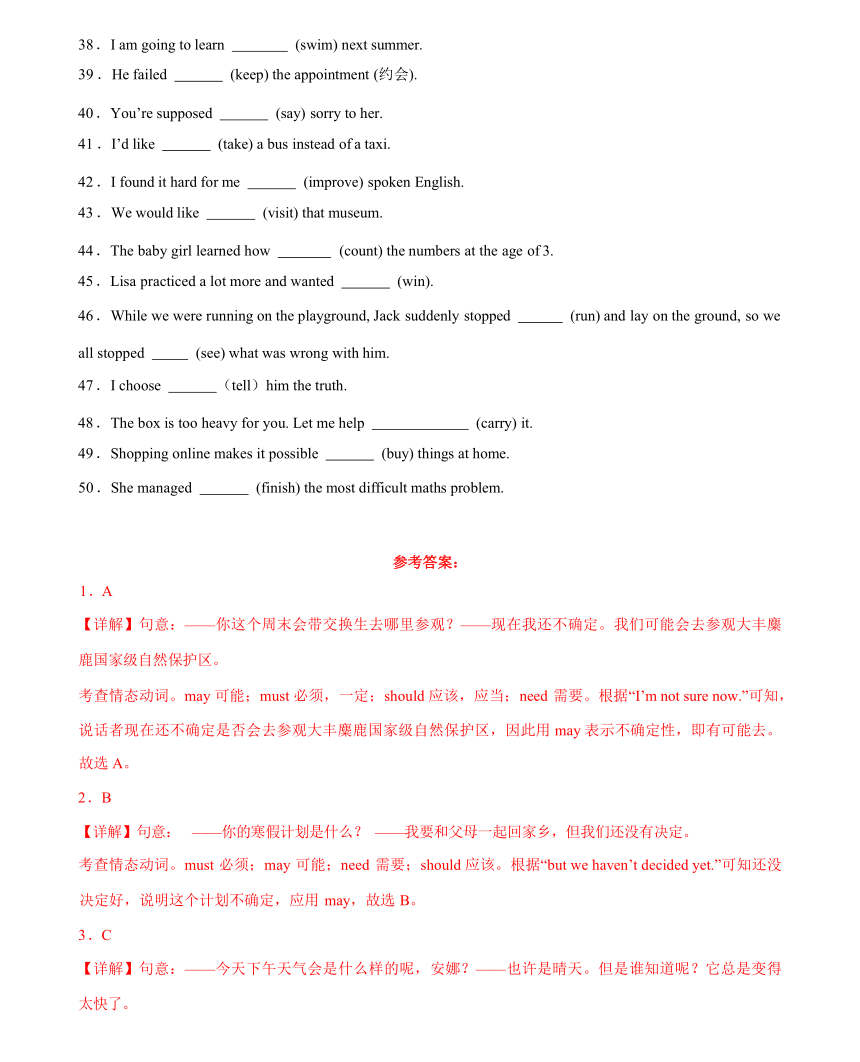
文档简介
2023-2024 学年八年级英语上册(牛津译林版)
Unit 5 Wild animals(重点语法提升练)
may 表可能性和动词不定式作宾语
may/might 表示推测、可能性(不用于疑问句)。
might 不是过去式,它所表示的可能性比 may 小。
如:He may / might be very busy now. 他现在可能很忙。
动词不定式作宾语
(1)接不定式作宾语的动词( “动词+to do” 结构)常见的有:
learn 学会 plan 计划 decide 决定 try 尽力 choose 选择 agree 同意
refuse 拒绝 pretend 假装 offer 主动 would like / want 想要 expect 期望
hope / wish 希望 promise 承诺 afford 负担得起 prefer 喜欢
help 帮助(help to do / help do) like 喜欢(like to do / doing)
continue 继续(continue to do / doing) begin / start 开始(begin / start to do / doing)
如: I would like to have a sandwich. 我想要吃一个三明治。
(2)动词不定式作宾语,置句末,前面用 it 指代不定式,it 是形式宾语。
如: We found it difficult to understand what you said. 我们发现很难理解你所说的话。
(3)有的动词在不定式前可加上疑问词(who ,what ,which 等)作宾语(即“ 动词+疑问词+to do” 结
构),常见的有: show 表明、指示; know 知道; tell 告诉; teach 教; learn 学习; decide 决定。
如: Larry didn’t know how to tell her the bad news. 拉里不知道如何告诉她这个坏消息。
一、单项选择
1 .—Where will you show the exchange students around this weekend
—I’m not sure now. We visit Dafeng Milu National Nature Reserve.
A .may B .must C .should D .need
2 .—What’s your plan for the winter holiday
—I go back to my hometown with my parents, but we haven’t decided yet.
A .must B .may C .need D .should
3 .—What will the weather be like this afternoon,Anna
—It be fine. But who knows It’s always changing quickly.
A .must B .should C .may D .need
4 .—Will your father be back home at 6 o’clock this evening
—He should, but he not. Sometimes he goes to the gym after work.
A .can B .must C .need D .may
5 .—How nice the building is! What is it for
—It a hotel. But I’m not so sure.
A .must be B .should be C .may be D .can be
6 .It is sunny now, but let’s take an umbrella because it rain later.
A .may B .must C .need D ./
7 .—Where are you going in the winter holiday
—I go to Macao, but I’m not sure.
A .needn’t B .may C .must D .can’t
8 .—It’s really cold today.
—And it’s cloudy too, so it snow.
A .can’t B .need C .might D .should
9 .—What’s that in the box
—I’m not sure. It be a pair of shoes.
A .must B .may C .will D .need
10 .—Who is singing in the next room It sounds like a young girl’s voice.
—I am not sure. It be Jane.
A .should B .must C .may D .will
11 .—Lily, Let’s Running Man tonight.
—Oh, no. That sounds boring. What can you expect from this kind of show
A.watch;learning B.to watch;to learn C.to watch;learning D.watch;to learn
12 .—Do you have any plans for the coming vacation
—Sure. We decide Shandong in July.
A .visit B .visiting C .visited D .to visit
13 .We only planned for an hour, but we stayed for three hours at last.
A .to watch B .watching C .watch D .watched
14 .—What is Betty going to do this evening
—She wants a movie.
A .see B .to see C .seeing
15 .We didn’t stop until we reached the end.
A .having a rest B .to have a rest C .to having a rest D .have a rest
16 .—How do you plan your winter holiday, Tom
—I’m not sure. I may go to Shanghai.
A .to spend B .spend C .spent D .spending
17 .—When do you plan to the farm tomorrow
—After 6: 00 p. m. And I will spend a night there.
A .drive B .drove C .to drive
18 .—I’m planning the weekend with my grandparents.
—Oh, don’t to buy them some nice food.
A .to spend; forget B .to spend; remember C .spending; forget
19 .John likes . It’s sunny and hot today. He’d like in the river.
A .to swim; swimming B .swimming; swimming
C .swimming; to swim D .swim: to swim
20 .—Don’t forget the TV when you leave the room, Tom.
—OK, Mom.
A .to turn off B .turning off C .to turn on D .turning on
21 .Here comes the bus. Many people can’t wait at once.
A .get on it B .to get it on C .getting it on D .to get on it
22 .—Just stop a rest, Mike. You keep reading for two hours.
—But the book is really interesting.
A .have B .to have C .to having D .having
23 .When I was young, I learnt in the pool.
A .to swim B .swimming C .swim D .swam
24 .—Daniel, do you know that bees never get lost
—Yes. Bees always remember the same way as they went.
A .coming back B .came back C .comes back D .to come back
25 .Remember the windows when you leave home.
A .close B .to close C .closing D .closed
26 .I like the Beijing Opera very much, so Li Lei offered me to watch it.
A .took B .takes C .to take D .taking
27 .Jack can’t stand the boring movie. He can’t wait the cinema.
A.to watch; to leave B.watching; leaving C.to watch; leaving D.watching; to
leave
28 .Wang Lin hopes English well because she plans to England.
A .learn; to go B .to learn; to go C .learning; to go
29 .Tina agreed me English in her free time.
A .teach B .teaching C .taught D .to teach
30 .He needs time with his child.
A .spends B .spending C .to spend D .spend
二、用所给单词的正确形式填空
31 .—I like watching TV in my spare time.
—Me too. Time seems (go) faster when I am watching TV.
32 .He needs (meet) his e-friend at the gate of the park.
33 .I hope (understand)more next time.
34 .We should offer (help) the poor in time.
35 .My sister prepared (go) shopping with her friends.
36 .I wish (get) the first prize in the test.
37 .If you promise (take) my advice, you are sure to do your job better.
38 .I am going to learn (swim) next summer.
39 .He failed (keep) the appointment (约会).
40 .You’re supposed (say) sorry to her.
41 .I’d like (take) a bus instead of a taxi.
42 .I found it hard for me (improve) spoken English.
43 .We would like (visit) that museum.
44 .The baby girl learned how (count) the numbers at the age of 3.
45 .Lisa practiced a lot more and wanted (win).
46 .While we were running on the playground, Jack suddenly stopped (run) and lay on the ground, so we
all stopped (see) what was wrong with him.
47 .I choose (tell)him the truth.
48 .The box is too heavy for you. Let me help (carry) it.
49 .Shopping online makes it possible (buy) things at home.
50 .She managed (finish) the most difficult maths problem.
参考答案:
1 .A
【详解】句意:——你这个周末会带交换生去哪里参观?——现在我还不确定。我们可能会去参观大丰麋
鹿国家级自然保护区。
考查情态动词。may 可能;must 必须,一定;should 应该,应当;need 需要。根据“I’m not sure now.”可知, 说话者现在还不确定是否会去参观大丰麋鹿国家级自然保护区,因此用 may 表示不确定性,即有可能去。
故选 A。
2 .B
【详解】句意: ——你的寒假计划是什么? ——我要和父母一起回家乡,但我们还没有决定。
考查情态动词。must 必须;may 可能;need 需要;should 应该。根据“but we haven’t decided yet.”可知还没
决定好,说明这个计划不确定,应用 may,故选 B。
3 .C
【详解】句意:——今天下午天气会是什么样的呢,安娜?——也许是晴天。但是谁知道呢?它总是变得
太快了。
考查情态动词辨析。 must 必须;should 应该;may 也许;need 需要。根据“But who knows It’s always changing
quickly.”可知是不确定天气的,用 may 表示不确定。故选 C。
4 .D
【详解】句意: ——爸爸今晚 6 点会回家吗? ——他应该,但可能不会。有时他下班后去体育馆。
考查情态动词。 can 可以;must 必须;need 需要;may 可能。根据“but”表转折及“Sometimes he goes to the gym
after work.”可知,他可能不会在 6 点回家,空处表示可能性推测,用 may 表示。故选 D。
5 .C
【详解】句意: ——这建筑真漂亮!这是干什么用的? ——可能是酒店。但我不确定。
考查情态动词辨析。must be 必须;should be 应该;may be 可能;can be 可以。根据“But I’m not so sure.”可
知,此处表示推测,用 may be。故选 C。
6 .A
【详解】句意:现在阳光明媚,但是我们带上把伞吧,因为稍后可能下雨。
考查情态动词用法。 may 也许;must 一定;need 需要。根据“rain later”及句意可知,表示可能性不大的肯定
推测用 may。故选 A。
7 .B
【详解】句意: ——寒假你要去哪里? ——我可能会去澳门,但我不确定。
考查情态动词。needn’t 不需要;may 可能;must 一定;can’t 不可能。根据“but I’m not sure.”可知,此处是
没有把握的推测,应使用情态动词 may。故选 B。
8 .C
【详解】句意: ——今天真的很冷。 ——而且天也多云,所以可能会下雪。
考查情态动词。 can’t 不能;need 需要;might 可能;should 应该。根据“And it’s cloudy too, so it...snow.”可知,
此处指天很冷很阴,可能会下雪。故选 C。
9 .B
【详解】句意: ——盒子里面是什么? ——我不确定。它可能是一双鞋。
考查情态动词。must 必须;may 可能;will 将会;need 需要。根据“I’m not sure. It...be a pair of shoes.”可知,
不确定,所以设空处表示猜测“可能;也许” ,选项 B 符合语境。故选 B。
10 .C
【详解】句意: ——谁在隔壁房间唱歌?听起来像是一个年轻女孩的声音。 ——我不确定。可能是简。
考查情态动词。should 应该;must 一定;may 可能;will 将。根据“I am not sure.”可知表示不确定的推测应
用 may。故选 C。
11 .D
【详解】句意:——Lily,我们今晚看《奔跑吧,兄弟》吧。 —— 喔,不要。那听起来很无聊啊。你希望能
从这种节目学到什么呢?
考查动词不定式作宾语和宾语补足语。watch 观看,动词原形;to watch 观看,动词不定式;learning 学习, 动名词或现在分词;to learn 学习,动词不定式。根据“let’s”可知此处应用动词短语 let sb do sth 表示“让某人 做某事” ,因此第一空应用动词 watch 省略 to 的不定式作宾语补足语,即用动词原形;动词短语 expect to do
sth 表示“期待做某事” ,因此第二空应用动词 learn 的不定式to learn 作宾语。故选 D。
12 .D
【详解】句意: ——你对即将到来的假期有什么计划吗? —— 当然,我们决定七月份去山东。
考查非谓语动词。 decide to do sth.意为“决定做某事” ,固定用法,因此此处用 to visit 作宾语。故选 D。
13 .A
【详解】句意:我们本来只打算看一个小时,但最后我们待了三个小时。
考查非谓语动词。 plan to do sth“计划做某事” ,故选 A。
14 .B
【详解】句意: —— 贝蒂今晚打算做什么? ——她想看电影。
考查非谓语动词。 want to do sth“想要做某事” ,动词不定式作宾语。故选 B。
15 .B
【详解】句意:直到我们到达终点时,我们才停下来休息。
考查非谓语。 stop doing 表示“停止正在做的事” ,stop to do 表示“停下来去做另一件事” ,分析句子可知这里
是停下来去休息,应用 stop to do。故选 B。
16 .A
【详解】句意: ——汤姆,你打算怎样度过寒假? ——我不确定。我可能去上海。
考查非谓语动词。 plan to do sth.“计划做某事” ,动词不定式作宾语。故选 A。
17 .C
【详解】句意: —— 明天什么时候计划开车去农场? —— 晚上六点后。我将在那儿过一夜。
考查不定式结构。drive 动词原形;drove 动词过去式;to drive 不定式结构。plan to do“计划做某事” ,是固
定短语。故选 C。
18 .A
【详解】句意: ——我正计划和我的祖父母度过周末。 —— 哦,不要忘记给他们买一些好吃的。
考查动词短语和动词辨析。plan to do sth. 计划做某事;forget to do sth. 忘记要做某事;remember to do sth. 记得要做某事。由 plan 可知, 第一个空格处填不定式 to spend,由“don’t … to buy them some nice food.”可知
是,不要忘记给祖父母买好吃的,第二空格处填 forget,故选 A。
19 .C
【详解】句意:约翰喜欢游泳。今天阳光明媚,天气炎热。他想在河里游泳。
考查非谓语动词。 like doing/to do sth.“喜欢做某事” ,排除 D;would like to do sth.“想要做某事” ,排除 AB。
故选 C。
20 .A
【详解】句意: ——汤姆,离开房间时别忘了关电视。 ——好的,妈妈。
考查动词短语。turn off 关闭;turn on 打开。根据“when you leave the room, Tom.”可知离开房间要关闭电视,
排除 CD;forget to do sth“忘记做某事” ,为固定短语,符合语境,故选 A。
21 .D
【详解】句意:公共汽车来了。很多人都迫不及待地想马上上车。
考查动词短语。根据“Many people can’t wait…at once.”可知, 此处指的是人们迫不及待地想上车。can’t wait to do sth.迫不及待做某事,空处应用动词的不定式;get on 为“动词+介词”短语,意为“上车” ,代词 it 应放在介
词 on 后面。故选 D。
22 .B
【详解】句意: ——停下来休息一下,迈克。你连续阅读两个小时了。 ——但是这本书真的很有趣。
考查非谓语动词。stop doing sth“停止正在做的事” ;stop to do sth“停下来去做另一件事”。根据“You keep
reading for two hours.”可知是建议对方停止读书去休息一下,用动词不定式作宾语。故选 B。
23 .A
【详解】句意:当我小的时候,我在游泳池里学游泳。
考查非谓语动词。 learn to do sth“学习做某事” ,动词不定式作宾语,故选 A。
24 .D
【详解】句意: ——丹尼尔,你知道蜜蜂从不迷路吗? ——是的。蜜蜂总是记得原路返回。
考查非谓语动词。remember to do sth“记得做某事(未做) ; remember doing sth“记得做过某事”。根据“Bees always remember ... the same way as they went.” 可知,“记得返回”这件事还未做,所以用 remember to do 的结
构,故选 D。
25 .B
【详解】句意:当你离开家时,记得关窗。
考查非谓语动词。 remember to do sth.意为“记得去做某事” ,表示事情还没有做;remember doing sth.意为“记 得做过某事” ,表示事情已经做过。根据“Remember…the windows when you leave home.”可知,此处表示还
没有关窗。故选 B。
26 .C
【详解】句意:我非常喜欢京剧,所以李磊主动提出带我去看。
考查非谓语动词。 offer to do sth.“主动提出做某事” ,动词不定式作宾语。故选 C。
27 .D
【详解】句意:杰克无法忍受看那部无聊的电影。他迫不及待地想离开电影院。
考查非谓语形式。根据“the boring movie”可知电影很无聊,进而推测 Jack 不想观看了,can’t stand doing“无 法忍受做某事” ,因此填 watching;根据前一句他不想看电影了,可知他想离开, can’t wait to do sth“迫不及
待想做某事” ,因此填 to leave。故选 D。
28 .B
【详解】句意:王琳希望学好英语,因为她打算去英国。
考查动词的非谓语形式。hope to do sth.“希望做某事” ,动词不定式作宾语;plan to do sth.“打算做某事” ,动
词不定式作宾语。故选 B。
29 .D
【详解】句意:蒂娜同意在空闲时间教我英语。
考查非谓语动词。 agree to do sth“同意做某事” ,是固定短语。故选 D。
30 .C
【详解】句意:他需要花时间和孩子在一起。
考查非谓语动词。 need to do sth“需要做某事” ,故选 C。
31 .to go
【详解】句意:——我喜欢在空闲时间看电视。 ——我也是。在我看电视的时候时间似乎走得更快。根据“Time
seems ”可知,此处是固定搭配 seem to do“似乎做某事” ,此处应用动词的不定式。故填 to go。
32 .to meet
【详解】句意:他需要在公园门口见他的网友。 need to do sth“需要做某事” ,空处用不定式作宾语。故填 to
meet。
33 .to understand
【详解】句意:我希望下次明白的更多。 “hope to do”希望做某事,因此填不定式。故填 to understand。
34 .to help
【详解】句意:我们应该及时主动帮助穷人。根据“We should offer…the poor in time.”可知, offer to do sth.主
动做某事。故填 to help。
35 .to go
【详解】句意:我姐姐准备和她的朋友一起去购物。根据“prepared”可知,考查“prepare to do”,意为“准备
做某事” ,所以填动词不定式,故填 to go。
36 .to get
【详解】句意:我希望在考试中得到一等奖。 wish to do sth.“希望做某事” 。故填 to get。
37 .to take
【详解】句意:如果你答应接受我的建议,你一定会把工作做得更好。 promise to do sth“答应做某事” ,空处
用不定式作宾语。故填 to take。
38 .to swim
【详解】句意:我想明年夏天去学习游泳。learn to do sth“学习做某事” ,空处应用动词不定式。故填 to
swim。
39 .to keep
【详解】句意:他未履约。 fail to do 表示“未能做某事” ,所以空处用动词不定式形式。故填 to keep。
40 .to say
【详解】句意:你应该向她道歉。 be supposed to do“应该做某事” ,动词不定式作宾语。故填 to say。
41 .to take
【详解】句意:我想乘公共汽车而不是出租车。 would like to do“想要做” ,为固定短语,故填 to take。
42 .to improve
【详解】句意:我发现我很难提高英语口语。本句考查“find+it+形容词+for sb to do sth”的句型,表示“发现
做某事对某人来说怎么样” ,所以空处用动词不定式。故填 to improve。
43 .to visit
【详解】句意:我们想要参观那个博物馆。根据“would like to do”想要做某事, 所以横线上应是不定式结构 to
visit。故填 to visit。
44 .to count
【详解】句意:这个女婴在 3 岁时学会了数数。 how to dosth.表示“如何做某事” ,因此此处用 to count ,动词
不定式作宾语,表示“数数” 。故填 to count。
45 .to win
【详解】句意:丽萨练习得更多,并且想要赢。根据“wanted”可知此处应是want to do“想要做某事” ,要用
动词不定式, win“赢” ,动词不定式是 to win。故填 to win。
46 . running to see
【详解】句意:当我们在操场上跑步时, 杰克突然停下来躺在地上, 所以我们都停下来看他怎么了。stop doing sth“停止在做的事情” ;stop to do sth“停下来去做另一件事”。第一空根据“lay on the ground”可知是停止跑步, 应用 stop doing;第二空根据“what was wrong with him.”可知是停下来去看看他怎么了,应用 stop to do。故
填 running;to see。
47 .to tell
【详解】句意:我选择告诉他真相。“choose to do sth”表示“选择做某事” ,动词不定式作宾语。故填 to tell。
48 .to carry/carry
【详解】句意:这箱子对你来说太重了。让我帮你拿吧。 help (to) do sth“帮助做某事” ,故填(to) carry。
49 .to buy
【详解】句意:网上购物使在家里买东西成为可能。 buy“买” ,make it adj. to do sth.“使做某事变得 … …”,it
作形式宾语,真正的宾语是动词不定式。故填 to buy。
50 .to finish
【详解】句意:她设法完成了最难的数学题。根据“the most difficult maths problem.”可知,这里指设法完成
最难的数学题, manage to do sth“设法做成某事” 。故填 to finish。
Unit 5 Wild animals(重点语法提升练)
may 表可能性和动词不定式作宾语
may/might 表示推测、可能性(不用于疑问句)。
might 不是过去式,它所表示的可能性比 may 小。
如:He may / might be very busy now. 他现在可能很忙。
动词不定式作宾语
(1)接不定式作宾语的动词( “动词+to do” 结构)常见的有:
learn 学会 plan 计划 decide 决定 try 尽力 choose 选择 agree 同意
refuse 拒绝 pretend 假装 offer 主动 would like / want 想要 expect 期望
hope / wish 希望 promise 承诺 afford 负担得起 prefer 喜欢
help 帮助(help to do / help do) like 喜欢(like to do / doing)
continue 继续(continue to do / doing) begin / start 开始(begin / start to do / doing)
如: I would like to have a sandwich. 我想要吃一个三明治。
(2)动词不定式作宾语,置句末,前面用 it 指代不定式,it 是形式宾语。
如: We found it difficult to understand what you said. 我们发现很难理解你所说的话。
(3)有的动词在不定式前可加上疑问词(who ,what ,which 等)作宾语(即“ 动词+疑问词+to do” 结
构),常见的有: show 表明、指示; know 知道; tell 告诉; teach 教; learn 学习; decide 决定。
如: Larry didn’t know how to tell her the bad news. 拉里不知道如何告诉她这个坏消息。
一、单项选择
1 .—Where will you show the exchange students around this weekend
—I’m not sure now. We visit Dafeng Milu National Nature Reserve.
A .may B .must C .should D .need
2 .—What’s your plan for the winter holiday
—I go back to my hometown with my parents, but we haven’t decided yet.
A .must B .may C .need D .should
3 .—What will the weather be like this afternoon,Anna
—It be fine. But who knows It’s always changing quickly.
A .must B .should C .may D .need
4 .—Will your father be back home at 6 o’clock this evening
—He should, but he not. Sometimes he goes to the gym after work.
A .can B .must C .need D .may
5 .—How nice the building is! What is it for
—It a hotel. But I’m not so sure.
A .must be B .should be C .may be D .can be
6 .It is sunny now, but let’s take an umbrella because it rain later.
A .may B .must C .need D ./
7 .—Where are you going in the winter holiday
—I go to Macao, but I’m not sure.
A .needn’t B .may C .must D .can’t
8 .—It’s really cold today.
—And it’s cloudy too, so it snow.
A .can’t B .need C .might D .should
9 .—What’s that in the box
—I’m not sure. It be a pair of shoes.
A .must B .may C .will D .need
10 .—Who is singing in the next room It sounds like a young girl’s voice.
—I am not sure. It be Jane.
A .should B .must C .may D .will
11 .—Lily, Let’s Running Man tonight.
—Oh, no. That sounds boring. What can you expect from this kind of show
A.watch;learning B.to watch;to learn C.to watch;learning D.watch;to learn
12 .—Do you have any plans for the coming vacation
—Sure. We decide Shandong in July.
A .visit B .visiting C .visited D .to visit
13 .We only planned for an hour, but we stayed for three hours at last.
A .to watch B .watching C .watch D .watched
14 .—What is Betty going to do this evening
—She wants a movie.
A .see B .to see C .seeing
15 .We didn’t stop until we reached the end.
A .having a rest B .to have a rest C .to having a rest D .have a rest
16 .—How do you plan your winter holiday, Tom
—I’m not sure. I may go to Shanghai.
A .to spend B .spend C .spent D .spending
17 .—When do you plan to the farm tomorrow
—After 6: 00 p. m. And I will spend a night there.
A .drive B .drove C .to drive
18 .—I’m planning the weekend with my grandparents.
—Oh, don’t to buy them some nice food.
A .to spend; forget B .to spend; remember C .spending; forget
19 .John likes . It’s sunny and hot today. He’d like in the river.
A .to swim; swimming B .swimming; swimming
C .swimming; to swim D .swim: to swim
20 .—Don’t forget the TV when you leave the room, Tom.
—OK, Mom.
A .to turn off B .turning off C .to turn on D .turning on
21 .Here comes the bus. Many people can’t wait at once.
A .get on it B .to get it on C .getting it on D .to get on it
22 .—Just stop a rest, Mike. You keep reading for two hours.
—But the book is really interesting.
A .have B .to have C .to having D .having
23 .When I was young, I learnt in the pool.
A .to swim B .swimming C .swim D .swam
24 .—Daniel, do you know that bees never get lost
—Yes. Bees always remember the same way as they went.
A .coming back B .came back C .comes back D .to come back
25 .Remember the windows when you leave home.
A .close B .to close C .closing D .closed
26 .I like the Beijing Opera very much, so Li Lei offered me to watch it.
A .took B .takes C .to take D .taking
27 .Jack can’t stand the boring movie. He can’t wait the cinema.
A.to watch; to leave B.watching; leaving C.to watch; leaving D.watching; to
leave
28 .Wang Lin hopes English well because she plans to England.
A .learn; to go B .to learn; to go C .learning; to go
29 .Tina agreed me English in her free time.
A .teach B .teaching C .taught D .to teach
30 .He needs time with his child.
A .spends B .spending C .to spend D .spend
二、用所给单词的正确形式填空
31 .—I like watching TV in my spare time.
—Me too. Time seems (go) faster when I am watching TV.
32 .He needs (meet) his e-friend at the gate of the park.
33 .I hope (understand)more next time.
34 .We should offer (help) the poor in time.
35 .My sister prepared (go) shopping with her friends.
36 .I wish (get) the first prize in the test.
37 .If you promise (take) my advice, you are sure to do your job better.
38 .I am going to learn (swim) next summer.
39 .He failed (keep) the appointment (约会).
40 .You’re supposed (say) sorry to her.
41 .I’d like (take) a bus instead of a taxi.
42 .I found it hard for me (improve) spoken English.
43 .We would like (visit) that museum.
44 .The baby girl learned how (count) the numbers at the age of 3.
45 .Lisa practiced a lot more and wanted (win).
46 .While we were running on the playground, Jack suddenly stopped (run) and lay on the ground, so we
all stopped (see) what was wrong with him.
47 .I choose (tell)him the truth.
48 .The box is too heavy for you. Let me help (carry) it.
49 .Shopping online makes it possible (buy) things at home.
50 .She managed (finish) the most difficult maths problem.
参考答案:
1 .A
【详解】句意:——你这个周末会带交换生去哪里参观?——现在我还不确定。我们可能会去参观大丰麋
鹿国家级自然保护区。
考查情态动词。may 可能;must 必须,一定;should 应该,应当;need 需要。根据“I’m not sure now.”可知, 说话者现在还不确定是否会去参观大丰麋鹿国家级自然保护区,因此用 may 表示不确定性,即有可能去。
故选 A。
2 .B
【详解】句意: ——你的寒假计划是什么? ——我要和父母一起回家乡,但我们还没有决定。
考查情态动词。must 必须;may 可能;need 需要;should 应该。根据“but we haven’t decided yet.”可知还没
决定好,说明这个计划不确定,应用 may,故选 B。
3 .C
【详解】句意:——今天下午天气会是什么样的呢,安娜?——也许是晴天。但是谁知道呢?它总是变得
太快了。
考查情态动词辨析。 must 必须;should 应该;may 也许;need 需要。根据“But who knows It’s always changing
quickly.”可知是不确定天气的,用 may 表示不确定。故选 C。
4 .D
【详解】句意: ——爸爸今晚 6 点会回家吗? ——他应该,但可能不会。有时他下班后去体育馆。
考查情态动词。 can 可以;must 必须;need 需要;may 可能。根据“but”表转折及“Sometimes he goes to the gym
after work.”可知,他可能不会在 6 点回家,空处表示可能性推测,用 may 表示。故选 D。
5 .C
【详解】句意: ——这建筑真漂亮!这是干什么用的? ——可能是酒店。但我不确定。
考查情态动词辨析。must be 必须;should be 应该;may be 可能;can be 可以。根据“But I’m not so sure.”可
知,此处表示推测,用 may be。故选 C。
6 .A
【详解】句意:现在阳光明媚,但是我们带上把伞吧,因为稍后可能下雨。
考查情态动词用法。 may 也许;must 一定;need 需要。根据“rain later”及句意可知,表示可能性不大的肯定
推测用 may。故选 A。
7 .B
【详解】句意: ——寒假你要去哪里? ——我可能会去澳门,但我不确定。
考查情态动词。needn’t 不需要;may 可能;must 一定;can’t 不可能。根据“but I’m not sure.”可知,此处是
没有把握的推测,应使用情态动词 may。故选 B。
8 .C
【详解】句意: ——今天真的很冷。 ——而且天也多云,所以可能会下雪。
考查情态动词。 can’t 不能;need 需要;might 可能;should 应该。根据“And it’s cloudy too, so it...snow.”可知,
此处指天很冷很阴,可能会下雪。故选 C。
9 .B
【详解】句意: ——盒子里面是什么? ——我不确定。它可能是一双鞋。
考查情态动词。must 必须;may 可能;will 将会;need 需要。根据“I’m not sure. It...be a pair of shoes.”可知,
不确定,所以设空处表示猜测“可能;也许” ,选项 B 符合语境。故选 B。
10 .C
【详解】句意: ——谁在隔壁房间唱歌?听起来像是一个年轻女孩的声音。 ——我不确定。可能是简。
考查情态动词。should 应该;must 一定;may 可能;will 将。根据“I am not sure.”可知表示不确定的推测应
用 may。故选 C。
11 .D
【详解】句意:——Lily,我们今晚看《奔跑吧,兄弟》吧。 —— 喔,不要。那听起来很无聊啊。你希望能
从这种节目学到什么呢?
考查动词不定式作宾语和宾语补足语。watch 观看,动词原形;to watch 观看,动词不定式;learning 学习, 动名词或现在分词;to learn 学习,动词不定式。根据“let’s”可知此处应用动词短语 let sb do sth 表示“让某人 做某事” ,因此第一空应用动词 watch 省略 to 的不定式作宾语补足语,即用动词原形;动词短语 expect to do
sth 表示“期待做某事” ,因此第二空应用动词 learn 的不定式to learn 作宾语。故选 D。
12 .D
【详解】句意: ——你对即将到来的假期有什么计划吗? —— 当然,我们决定七月份去山东。
考查非谓语动词。 decide to do sth.意为“决定做某事” ,固定用法,因此此处用 to visit 作宾语。故选 D。
13 .A
【详解】句意:我们本来只打算看一个小时,但最后我们待了三个小时。
考查非谓语动词。 plan to do sth“计划做某事” ,故选 A。
14 .B
【详解】句意: —— 贝蒂今晚打算做什么? ——她想看电影。
考查非谓语动词。 want to do sth“想要做某事” ,动词不定式作宾语。故选 B。
15 .B
【详解】句意:直到我们到达终点时,我们才停下来休息。
考查非谓语。 stop doing 表示“停止正在做的事” ,stop to do 表示“停下来去做另一件事” ,分析句子可知这里
是停下来去休息,应用 stop to do。故选 B。
16 .A
【详解】句意: ——汤姆,你打算怎样度过寒假? ——我不确定。我可能去上海。
考查非谓语动词。 plan to do sth.“计划做某事” ,动词不定式作宾语。故选 A。
17 .C
【详解】句意: —— 明天什么时候计划开车去农场? —— 晚上六点后。我将在那儿过一夜。
考查不定式结构。drive 动词原形;drove 动词过去式;to drive 不定式结构。plan to do“计划做某事” ,是固
定短语。故选 C。
18 .A
【详解】句意: ——我正计划和我的祖父母度过周末。 —— 哦,不要忘记给他们买一些好吃的。
考查动词短语和动词辨析。plan to do sth. 计划做某事;forget to do sth. 忘记要做某事;remember to do sth. 记得要做某事。由 plan 可知, 第一个空格处填不定式 to spend,由“don’t … to buy them some nice food.”可知
是,不要忘记给祖父母买好吃的,第二空格处填 forget,故选 A。
19 .C
【详解】句意:约翰喜欢游泳。今天阳光明媚,天气炎热。他想在河里游泳。
考查非谓语动词。 like doing/to do sth.“喜欢做某事” ,排除 D;would like to do sth.“想要做某事” ,排除 AB。
故选 C。
20 .A
【详解】句意: ——汤姆,离开房间时别忘了关电视。 ——好的,妈妈。
考查动词短语。turn off 关闭;turn on 打开。根据“when you leave the room, Tom.”可知离开房间要关闭电视,
排除 CD;forget to do sth“忘记做某事” ,为固定短语,符合语境,故选 A。
21 .D
【详解】句意:公共汽车来了。很多人都迫不及待地想马上上车。
考查动词短语。根据“Many people can’t wait…at once.”可知, 此处指的是人们迫不及待地想上车。can’t wait to do sth.迫不及待做某事,空处应用动词的不定式;get on 为“动词+介词”短语,意为“上车” ,代词 it 应放在介
词 on 后面。故选 D。
22 .B
【详解】句意: ——停下来休息一下,迈克。你连续阅读两个小时了。 ——但是这本书真的很有趣。
考查非谓语动词。stop doing sth“停止正在做的事” ;stop to do sth“停下来去做另一件事”。根据“You keep
reading for two hours.”可知是建议对方停止读书去休息一下,用动词不定式作宾语。故选 B。
23 .A
【详解】句意:当我小的时候,我在游泳池里学游泳。
考查非谓语动词。 learn to do sth“学习做某事” ,动词不定式作宾语,故选 A。
24 .D
【详解】句意: ——丹尼尔,你知道蜜蜂从不迷路吗? ——是的。蜜蜂总是记得原路返回。
考查非谓语动词。remember to do sth“记得做某事(未做) ; remember doing sth“记得做过某事”。根据“Bees always remember ... the same way as they went.” 可知,“记得返回”这件事还未做,所以用 remember to do 的结
构,故选 D。
25 .B
【详解】句意:当你离开家时,记得关窗。
考查非谓语动词。 remember to do sth.意为“记得去做某事” ,表示事情还没有做;remember doing sth.意为“记 得做过某事” ,表示事情已经做过。根据“Remember…the windows when you leave home.”可知,此处表示还
没有关窗。故选 B。
26 .C
【详解】句意:我非常喜欢京剧,所以李磊主动提出带我去看。
考查非谓语动词。 offer to do sth.“主动提出做某事” ,动词不定式作宾语。故选 C。
27 .D
【详解】句意:杰克无法忍受看那部无聊的电影。他迫不及待地想离开电影院。
考查非谓语形式。根据“the boring movie”可知电影很无聊,进而推测 Jack 不想观看了,can’t stand doing“无 法忍受做某事” ,因此填 watching;根据前一句他不想看电影了,可知他想离开, can’t wait to do sth“迫不及
待想做某事” ,因此填 to leave。故选 D。
28 .B
【详解】句意:王琳希望学好英语,因为她打算去英国。
考查动词的非谓语形式。hope to do sth.“希望做某事” ,动词不定式作宾语;plan to do sth.“打算做某事” ,动
词不定式作宾语。故选 B。
29 .D
【详解】句意:蒂娜同意在空闲时间教我英语。
考查非谓语动词。 agree to do sth“同意做某事” ,是固定短语。故选 D。
30 .C
【详解】句意:他需要花时间和孩子在一起。
考查非谓语动词。 need to do sth“需要做某事” ,故选 C。
31 .to go
【详解】句意:——我喜欢在空闲时间看电视。 ——我也是。在我看电视的时候时间似乎走得更快。根据“Time
seems ”可知,此处是固定搭配 seem to do“似乎做某事” ,此处应用动词的不定式。故填 to go。
32 .to meet
【详解】句意:他需要在公园门口见他的网友。 need to do sth“需要做某事” ,空处用不定式作宾语。故填 to
meet。
33 .to understand
【详解】句意:我希望下次明白的更多。 “hope to do”希望做某事,因此填不定式。故填 to understand。
34 .to help
【详解】句意:我们应该及时主动帮助穷人。根据“We should offer…the poor in time.”可知, offer to do sth.主
动做某事。故填 to help。
35 .to go
【详解】句意:我姐姐准备和她的朋友一起去购物。根据“prepared”可知,考查“prepare to do”,意为“准备
做某事” ,所以填动词不定式,故填 to go。
36 .to get
【详解】句意:我希望在考试中得到一等奖。 wish to do sth.“希望做某事” 。故填 to get。
37 .to take
【详解】句意:如果你答应接受我的建议,你一定会把工作做得更好。 promise to do sth“答应做某事” ,空处
用不定式作宾语。故填 to take。
38 .to swim
【详解】句意:我想明年夏天去学习游泳。learn to do sth“学习做某事” ,空处应用动词不定式。故填 to
swim。
39 .to keep
【详解】句意:他未履约。 fail to do 表示“未能做某事” ,所以空处用动词不定式形式。故填 to keep。
40 .to say
【详解】句意:你应该向她道歉。 be supposed to do“应该做某事” ,动词不定式作宾语。故填 to say。
41 .to take
【详解】句意:我想乘公共汽车而不是出租车。 would like to do“想要做” ,为固定短语,故填 to take。
42 .to improve
【详解】句意:我发现我很难提高英语口语。本句考查“find+it+形容词+for sb to do sth”的句型,表示“发现
做某事对某人来说怎么样” ,所以空处用动词不定式。故填 to improve。
43 .to visit
【详解】句意:我们想要参观那个博物馆。根据“would like to do”想要做某事, 所以横线上应是不定式结构 to
visit。故填 to visit。
44 .to count
【详解】句意:这个女婴在 3 岁时学会了数数。 how to dosth.表示“如何做某事” ,因此此处用 to count ,动词
不定式作宾语,表示“数数” 。故填 to count。
45 .to win
【详解】句意:丽萨练习得更多,并且想要赢。根据“wanted”可知此处应是want to do“想要做某事” ,要用
动词不定式, win“赢” ,动词不定式是 to win。故填 to win。
46 . running to see
【详解】句意:当我们在操场上跑步时, 杰克突然停下来躺在地上, 所以我们都停下来看他怎么了。stop doing sth“停止在做的事情” ;stop to do sth“停下来去做另一件事”。第一空根据“lay on the ground”可知是停止跑步, 应用 stop doing;第二空根据“what was wrong with him.”可知是停下来去看看他怎么了,应用 stop to do。故
填 running;to see。
47 .to tell
【详解】句意:我选择告诉他真相。“choose to do sth”表示“选择做某事” ,动词不定式作宾语。故填 to tell。
48 .to carry/carry
【详解】句意:这箱子对你来说太重了。让我帮你拿吧。 help (to) do sth“帮助做某事” ,故填(to) carry。
49 .to buy
【详解】句意:网上购物使在家里买东西成为可能。 buy“买” ,make it adj. to do sth.“使做某事变得 … …”,it
作形式宾语,真正的宾语是动词不定式。故填 to buy。
50 .to finish
【详解】句意:她设法完成了最难的数学题。根据“the most difficult maths problem.”可知,这里指设法完成
最难的数学题, manage to do sth“设法做成某事” 。故填 to finish。
